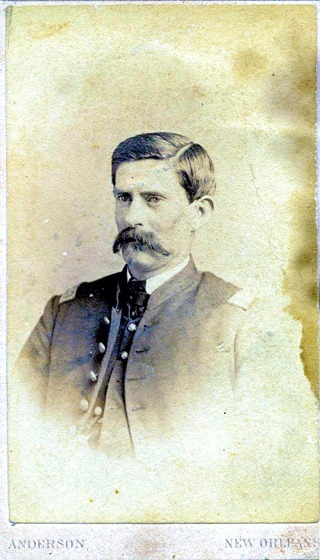Friday, 5th.—Passed through Paris at 6:30 o’clock a. m., on through Rutlege’s Mills, arriving at Cynthiana at 5 P. M. Greeted with an incessant waving of handkerchiefs all day; if there are any ugly girls in that country they all stayed at home that day, for these were all pretty.
Wednesday, September 5, 2012
SEPTEMBER 5TH —Our army knows no rest. But I fear this incessant marching and fighting may prove too much for many of the tender boys.
5th.—Our son J. arrived last night with quite a party, his health greatly suffering from over-work in Richmond during these exciting times. One of the party told me an anecdote of General J. E. B. Stuart, which pleased me greatly. Mrs. S. was in the cars, and near her sat a youth, in all the pride of his first Confederate uniform, who had attended General S. during his late raid as one of his guides through his native county of Hanover. At one of the water stations he was interesting the passengers by an animated account of their hair-breadth escapes by flood and field, and concluded by saying, “In all the tight places we got into, I never heard the General swear an oath, and I never saw him drink a drop.” Mrs. S. was an amused auditor of the excited narrative, and after the cars were in motion she leaned forward, introduced herself to the boy, and asked him if he knew the reason why General S. never swears nor drinks; adding, “It is because he is a Christian and loves God, and nothing will induce him to do what he thinks wrong, and I want you and all his soldiers to follow his example.”
 September 5th. Thursday morning, mounted guard in presence of a large crowd, including many ladies in carriages. Throughout the day hosts of people flocked about the camps, all very friendly, including one charming group of school girls, who, to us, were as the first appearance of the sun to the Northern explorer, after an arctic winter. Rumors of the enemy crossing the upper Potomac coming in hourly; the whole army is concentrating here and the country is covered with camps.
September 5th. Thursday morning, mounted guard in presence of a large crowd, including many ladies in carriages. Throughout the day hosts of people flocked about the camps, all very friendly, including one charming group of school girls, who, to us, were as the first appearance of the sun to the Northern explorer, after an arctic winter. Rumors of the enemy crossing the upper Potomac coming in hourly; the whole army is concentrating here and the country is covered with camps.
Henry Knowlton was commissioned a second lieutenant on September 5, 1862, and mustered into Company K, 33rd Missouri Infantry on September 11, 1862. On May 4, 1863, he was promoted to first lieutenant; promoted to captain on January 30, 1865, he was assigned to command Company D.
The 33rd Missouri Infantry was engaged in the Battle of Helena and participated in the Red River campaign, including the Battle of Pleasant Hill. The regiment also fought at the battles of Tupelo, Nashville, and Fort Blakely.
Knowlton mustered out with the regiment on August 10, 1865.
Carte-de-Visite by Anderson & Turner, New Orleans, La.
The Trans-Mississippi Theater Photo Archive image and information.
Civil War Portrait 002
September 5.—The One Hundred and Sixteenth regiment of New York volunteers under the command of Colonel Chapin, left Buffalo for the seat of war.—The rebel schooner Rising Sun, was captured by the boats of the United States steamer Wyandotte, in Brittan’s Bay, near the mouth of the Potomac River, Va.—Poolesville, Md., was taken possession of, and a detachment of Massachusetts cavalry stationed there was captured, by the rebel forces under Gen. Stuart. He crossed the Potomac River at Conrad’s Ferry without opposition, and was received with exultant demonstrations of favor, nearly all the population turning out to welcome him.—Philadelphia Press.
—The One Hundred and Twenty-eighth regiment of New York volunteers, under the command of Colonel David S. Cowles, left Hudson for the seat of war.—The ship Ocmulgee, of Edgartown, Mass., was burned at sea by the rebel privateer “290,” commanded by Capt. Semmes.
—Braxton Bragg, the rebel General at Sparta, Alabama, issued the following congratulatory order to his army:—
“Comrades: Our campaign opens auspiciously. The enemy is in full retreat, with consternation and demoralization devastating his ranks. To secure the fruits of this condition, we must press on vigorously and unceasingly.
“Alabamians! your State is redeemed. Tennesseeans! your capital and State are almost restored without firing a gun. You return conquerors. Kentuckians! the first great blow has been struck for your freedom. Soldiers from other States share the happiness of our more fortunate brothers, and will press on with them for the redemption of their homes and women.”
—Governor Morton, of Indiana, issued a proclamation calling upon the inhabitants of the counties bordering upon the Ohio River to meet at their respective places of holding elections, and form themselves into companies for military duty, and report to the Colonel of the Indiana Legion in their respective districts.
—General J. S. Morgan, commanding Union forces at Key West, Fla., issued an order directing that persons of African descent, including those held to service or labor under State laws, coming within the lines of his command, should be employed in the quartermaster’s department. The order also declared that all persons so employed should receive permanent protection against any compulsory return to a condition of servitude.
—Governor Tod, of Ohio, issued a proclamation informing the inhabitants of the State that no more volunteers were required for the protection of the city of Cincinnati.






